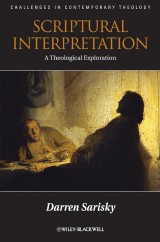Details

Scriptural Interpretation
A Theological ExplorationChallenges in Contemporary Theology, Band 33 1. Aufl.
|
81,70 € |
|
| Verlag: | Wiley-Blackwell |
| Format: | |
| Veröffentl.: | 15.08.2012 |
| ISBN/EAN: | 9781118367438 |
| Sprache: | englisch |
| Anzahl Seiten: | 296 |
DRM-geschütztes eBook, Sie benötigen z.B. Adobe Digital Editions und eine Adobe ID zum Lesen.
Beschreibungen
<p>In <i>Scriptural Interpretation</i>, Sarisky brilliantly draws together Patristic Theology and a theological interpretation of Scripture in the modern day, to examine Scripture’s central place in the life of the Church and ordinary believers.</p> <ul> <li>Examines the importance of scriptural interpretation in the life of Christians and of the church </li> <li>Draws together two lively discussions: a study of the theology of the Cappadocian fathers, and a discussion of theological interpretation of Scripture in the twentieth and twenty-first centuries</li> <li>Covers an impressive historical range, from Basil of Caesarea right up to the work of the major contemporary thinkers, Stanley Hauerwas and Rowan Williams</li> <li>Offers a sophisticated understanding of many Patristic thinkers – an area of huge current interest in the field – and challenges accepted readings of the theology of Basil of Caesarea</li> </ul>
Preface and Acknowledgments ix <p>Editions and Translations xii</p> <p>Abbreviations xv</p> <p>Introduction 1</p> <p>Part I: Basil of Caesarea 6</p> <p>Part II: Contemporary and Constructive Theology 27</p> <p>Summary of the Argument 33</p> <p><b>Part I Basil of Caesarea 35</b></p> <p><b>1 The Reader – A Little Lower than the Angels 37</b></p> <p>Angels: Perfect upon Creation 38</p> <p>Humanity: Perfected over Time 42</p> <p><b>2 The Text – Scriptural Paideia 71</b></p> <p>Anthropological Context 72</p> <p>Revelation 74</p> <p>Theological Account of Scripture 77</p> <p>The Utility of Scripture 85</p> <p><b>3 Reading – Eschatological Interpretation 90</b></p> <p>Theological Analysis of Reading 92</p> <p>The End of Reading 104</p> <p><b>4 Ecclesial Setting – Exegesis and Ecclesial Dogma 111</b></p> <p>A Concise History of Reception for De Spiritu Sancto 27 113</p> <p>Background to De Spiritu Sancto: The Notion of Craft 114</p> <p>A Reading of De Spiritu Sancto 27 117</p> <p>Conclusion to Part I: Basil’s Theological Account of Scriptural Interpretation 129</p> <p><b>Part II Contemporary and Constructive Theology 133</b></p> <p>Introduction to Part II: The Contemporary Debate 135</p> <p><b>5 The Reader – Restoring a Sense of the End 140</b></p> <p>The Critique of Modernity 141</p> <p>Narrative and Human Nature 145</p> <p><b>6 The Text – Scripture in the Flow of Time 159</b></p> <p>Revelation and Generativity 161</p> <p>A Text in Time 162</p> <p><b>7 Reading – Interpretation and the Time of Learning 173</b></p> <p>Reading as Shaped by Models of Scripture 174</p> <p>The Contour of the Time of Learning 176</p> <p><b>8 Ecclesial Setting – Practices Performed in Community 184</b></p> <p>The Ecclesial Framework 187</p> <p>Interpretation Situated in a Web of Practices 189</p> <p><b>9 A Constructive Account of Scriptural Interpretation 201</b></p> <p>Reader 205</p> <p>Text 212</p> <p>Reading 217</p> <p>Ecclesial Setting 224</p> <p>Conclusion 234</p> <p>Bibliography 245</p> <p>Index 265</p>
<a href="http://aqueductproject.org/darren-sarisky-scriptural-interpretation/">Interview with Darren Sarisky </a>- December 15th 2013
<p><b>Darren Sarisky</b> is a Junior Research Fellow at Homerton College, University of Cambridge. He previously served as a Teaching Associate in Doctrine at the University of Cambridge Divinity Faculty. Dr Sarisky’s primary area of research is the nature and interpretation of Christian Scripture.</p>
<p>Scripture is central to the life of Christian communities, but what is it that drives Christians to continuously reflect on its words? In offering a response, Sarisky examines scriptural interpretation from a theological viewpoint which centers on the following four issues: the identity of the reader of Scripture, the nature of the Bible itself, what occurs during the practice of reading, and the significance of reading’s location in an ecclesial setting. </p> <p>Divided into three parts, the book begins with a presentation of Basil of Caesarea’s theological account of biblical interpretation by synthesizing his position on these issues. It then offers a critical interaction with Stanley Hauerwas and Rowan Williams, both major contributors to the lively discussion of theological interpretation of Scripture. The book culminates with a third theological account: that it is necessary to view readers as creatures shaped in the image of God who find their purpose and fulfillment in attaining his likeness, yet there is a marked difference between how people are and how they ought to be. Scripture’s theological character is instrumental in highlighting this gap and restoring human life to its proper form. As a result, the ability of Scripture to allow readers to realize their vocation as human beings is central to the concept within Christian communities.</p>
<p>“Building on its astute analysis of elements of patristic and modern biblical hermeneutics, <i>Scriptural Interpretation</i> makes a persuasive theological proposal about how to be readers of the biblical text in the company of the church. Elegant, measured, rich in its details and penetrating in its judgements, this is one of the most distinguished accounts of the matter in recent years.”—<b><i>John Webster, King's College</i></b></p> <p>“Dr Sarisky is deeply immersed in the Bible, early Church writings and the Christian theology of recent decades, and he brings them to bear in a masterful way on the key theme of interpreting scripture. He puts a bold, well-supported case for the crucial importance of a thoroughly theological account of scripture, its readers, their corporate context and the practice of reading itself. His perceptive analyses and responses to Basil of Caesarea, Stanley Hauerwas and Rowan Williams culminate in a constructive contribution to what he rightly sees as one of the most important current debates in Christian theology. He does something that might seem obvious but is actually both unusual and difficult: he lets God be utterly central and pervasive to both the Bible and its reception.” <b><i>David F. Ford, University of Cambridge</i></b> </p>


















